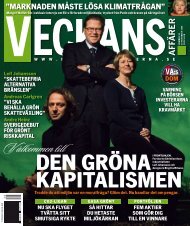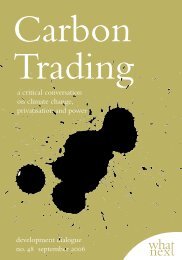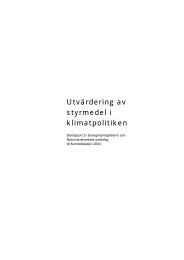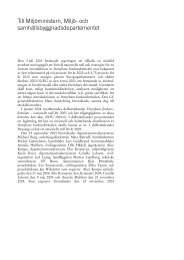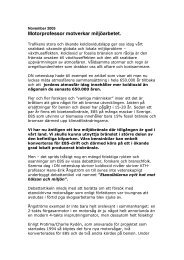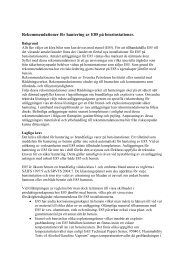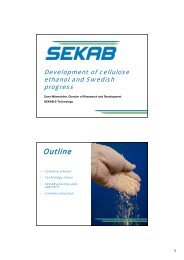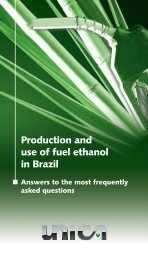Sugarcane ethanol: Contributions to climate change - BAFF
Sugarcane ethanol: Contributions to climate change - BAFF
Sugarcane ethanol: Contributions to climate change - BAFF
You also want an ePaper? Increase the reach of your titles
YUMPU automatically turns print PDFs into web optimized ePapers that Google loves.
Prospects of the sugarcane expansion in Brazil<br />
crops is larger than the amount of land displaced by sugarcane, indirect e�ect cannot be<br />
quanti�ed. �is is also the situation taking place in Brazil.<br />
For global scale considerations for ILUC, however, the analysis is much more complex. In<br />
this case, it is even more di�cult <strong>to</strong> determine the proper scale pertinent, considering that<br />
many countries produce and trade di�erent products that can be related <strong>to</strong> ILUC analysis.<br />
Regarding <strong>to</strong> shi�ing biomass use, Brazilian sugar production has also increased from 2002<br />
<strong>to</strong> 2006, from 22.5 <strong>to</strong> 29.6 million <strong>to</strong>ns, according <strong>to</strong> UNICA (2008). Meats and all grains<br />
production have also increased signi�cantly in the period and in the last years. �erefore,<br />
there was no need <strong>to</strong> convert land in other countries due <strong>to</strong> increase in <strong>ethanol</strong> production<br />
in Brazil. Nevertheless, all ILUC considerations can be considered preliminary and subject<br />
<strong>to</strong> improvements since the <strong>to</strong>pic has been developing fast recently.<br />
5. Conclusions and recommendations<br />
�is work was an e�ort <strong>to</strong> analyze land use <strong>change</strong>s due <strong>to</strong> sugarcane expansion in Brazil,<br />
contributing <strong>to</strong> the global debate about social and especially environmental bene�ts of<br />
<strong>ethanol</strong>. A careful look of the distribution of sugarcane shows that the crop is located and is<br />
expanding in regions that are devoted <strong>to</strong> agricultural production since a long time. Projections<br />
indicated that sugarcane expansion will continue <strong>to</strong> take place on these areas. �is means<br />
that there is no sugarcane expansion in the agricultural frontier, which is the place where<br />
agricultural production has been converting natural landscapes. �us, results are indicating<br />
that sugarcane is not directly pressing natural vegetation in any region in Brazil.<br />
�e use of di�erent methods gives consistency <strong>to</strong> the analysis, since each one has its<br />
weakness and strengths. Remote sensing images can be considered the most reliable source<br />
of information, however they focused only in areas where sugarcane expansion <strong>to</strong>ok place,<br />
neglecting dynamics of other crops and pasture land. Secondary data from IBGE cover<br />
all signi�cant productive land uses, nevertheless the data is subject <strong>to</strong> accuracy problems,<br />
especially those relating <strong>to</strong> areas dedicated <strong>to</strong> pasture. Case studies through environmental<br />
licensing reports can o�er profound analysis <strong>to</strong> understand the dynamics of the mill,<br />
although they are limited in scope of coverage. �e land use model projects future trends<br />
of land substitution among crops, based on past trends, but it relies on many economic<br />
assumptions.<br />
Both remote sensing and secondary data analysis have generated similar results regarding<br />
direct land use <strong>change</strong>s promoted by sugarcane expansion. Although results are di�erent<br />
in terms of crops and pasture land displacement, they both corroborate that sugarcane<br />
expansion has taken place with no direct e�ect on natural vegetation land. Furthermore,<br />
pasture is increasing its participation on the area displaced by sugarcane, and this pattern<br />
is expected <strong>to</strong> continue or even become more relevant in the future.<br />
<strong>Sugarcane</strong> <strong>ethanol</strong> 91



